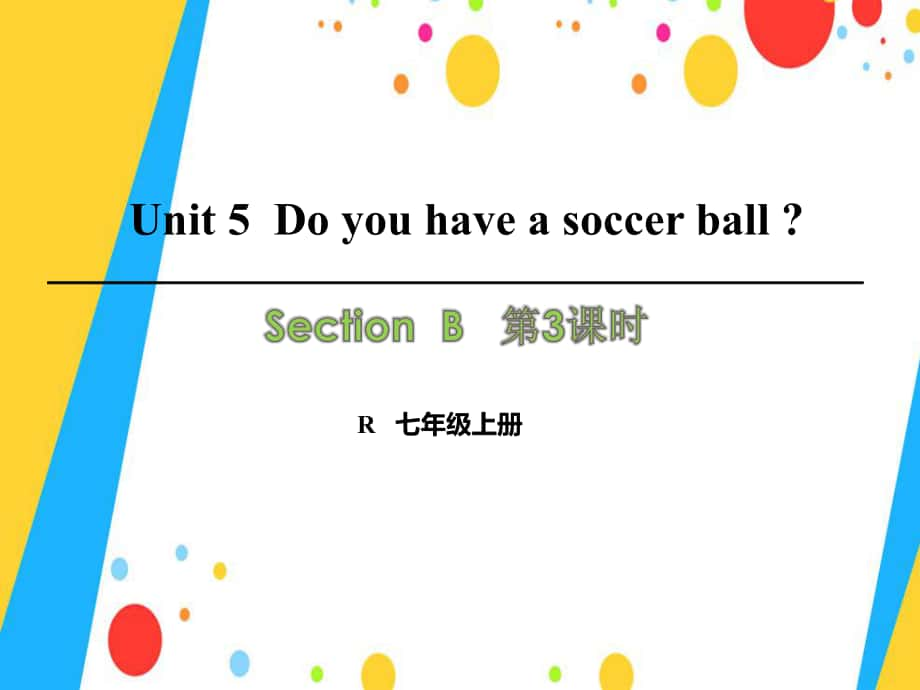《七年級(jí)英語(yǔ)上冊(cè) Unit 5 Do you have a soccer ball(第3課時(shí))Section B(1a1d)課件 (新版)人教新目標(biāo)版》由會(huì)員分享�,可在線閱讀,更多相關(guān)《七年級(jí)英語(yǔ)上冊(cè) Unit 5 Do you have a soccer ball(第3課時(shí))Section B(1a1d)課件 (新版)人教新目標(biāo)版(18頁(yè)珍藏版)》請(qǐng)?jiān)谘b配圖網(wǎng)上搜索���。
1、R 七年級(jí)上冊(cè)Unit 5 Do you have a soccer ball ?Lead-in I have, you have, they have.She has, he has, Mary has.Do I, do you, do they?Does she, does he, does Mary?I dont, you dont, they dont.She doesnt, he doesnt, Mary doesnt.Lets chantLets chant���!New words 1. interesting adj. 4. difficult adj. 5. boring adj.
2���、 3. relaxing adj. 2. fun adj. 6. watch TV有趣的有趣的,令人感興趣的令人感興趣的有趣的,令人愉快的有趣的�����,令人愉快的輕松的輕松的困難的困難的 hard無(wú)聊的無(wú)聊的,令人生厭的令人生厭的看電視看電視1aMatch the words with the pictures.1.interesting c 3.fun_ 5.relaxing . 2.boring 4.difficult _. eadb1bListen and check () the description words you hear in 1a1.interesting c 3.fun_ 5
3����、.relaxing . 2.boring 4.difficult . Listen again. What does Paul say about these activities? Choose a word from 1a to fill in each blank1cplay computer games _play volleyball _watch TV _play basketball _interestingdifficultboringfun1dYou are Paul. Your partner is Pauls friend Jenny. Talk about the ac
4、tivities in 1c.Lets play volleyball.Play rolesThat sounds difficult.Lets play basketball.That sounds fun.Language points1. That sounds interesting. 那聽(tīng)起來(lái)有趣���。那聽(tīng)起來(lái)有趣�。 (1) interesting形容詞形容詞, 意為意為“有趣的有趣的”, 在句中可以作在句中可以作 定語(yǔ)定語(yǔ), 也可以作表語(yǔ)。也可以作表語(yǔ)�。 (2) interesting, boring和和relaxing都是由動(dòng)詞去都是由動(dòng)詞去e或直接或直接 加加-ing構(gòu)成的形容詞構(gòu)
5、成的形容詞, 可用來(lái)作定語(yǔ)修飾物或事情可用來(lái)作定語(yǔ)修飾物或事情, 或用來(lái)作表語(yǔ)描述某物或某事或用來(lái)作表語(yǔ)描述某物或某事, 但一般但一般不能修飾人不能修飾人 或描述人或描述人�。【歸納拓展】【歸納拓展】以以-ed結(jié)尾的形容詞結(jié)尾的形容詞以以-ed結(jié)尾的形容詞多用來(lái)修飾或者描述人結(jié)尾的形容詞多用來(lái)修飾或者描述人, 如如interested, bored和和relaxed�����。We are relaxed by listening to relaxing music. 我們通過(guò)聽(tīng)輕松的音樂(lè)來(lái)放松��。我們通過(guò)聽(tīng)輕松的音樂(lè)來(lái)放松����。2. fun adj. 有趣的有趣的; 使人快樂(lè)的使人快樂(lè)的 n. 樂(lè)趣樂(lè)趣; 快
6、樂(lè)快樂(lè) fun的用法的用法 (1) fun作為形容詞作為形容詞, 意為意為“有趣的有趣的; 使人快樂(lè)的使人快樂(lè)的”���。 在句中作表語(yǔ)�。在句中作表語(yǔ)���。 (2) 作為不可數(shù)名詞作為不可數(shù)名詞, 意為意為“樂(lè)趣樂(lè)趣; 快樂(lè)快樂(lè)”����。 have fun的用法的用法have fun意為意為“玩得高興玩得高興, 過(guò)得愉快過(guò)得愉快”。have fun doing sth. 意為意為“做某事高興做某事高興”��。They have fun watching TV. 他們看著電視過(guò)得很愉快���。他們看著電視過(guò)得很愉快���。. 用所給詞的適當(dāng)形式填空用所給詞的適當(dāng)形式填空1. Let (I) get the hat for yo
7、u. 2. Lets (play) volleyball. 3. We (watch) TV on Sunday (星期日星期日) . 4. Mike (have) a white model plane. 5. He (not play) ping-pong. Exercise meplaywatchhasdoesnt play. 單項(xiàng)選擇單項(xiàng)選擇1. My sister hasvolleyball and she likes to play volleyball very much. A. the; theB. a; theC. a; /D. /; a2. I like to watch
8���、TV. I think its. A. interestingB. boring C. difficult D. not fun3. Where is your computer? on the desk. A. game; They are B. game; It is C. games; They are D. games; It is4. We cant findschoolbags. Can you help? A. us; usB. we; usC. our; weD. our; us5. Do you watch TV every day? I think its boring. A. Yes, I do. B. No, I dont. C. Yes, she does. D. No, she doesnt. 同學(xué)們,這一課學(xué)習(xí)的單詞你們都掌握了嗎���?現(xiàn)在大同學(xué)們�,這一課學(xué)習(xí)的單詞你們都掌握了嗎�?現(xiàn)在大家來(lái)檢驗(yàn)一下,點(diǎn)擊下面的視頻開(kāi)始聽(tīng)寫(xiě)吧家來(lái)檢驗(yàn)一下����,點(diǎn)擊下面的視頻開(kāi)始聽(tīng)寫(xiě)吧!
 七年級(jí)英語(yǔ)上冊(cè) Unit 5 Do you have a soccer ball(第3課時(shí))Section B(1a1d)課件 (新版)人教新目標(biāo)版
七年級(jí)英語(yǔ)上冊(cè) Unit 5 Do you have a soccer ball(第3課時(shí))Section B(1a1d)課件 (新版)人教新目標(biāo)版

